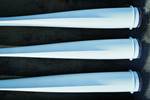ECORES WIND builds on wind blade circularity initiatives
Latest Horizon Europe project seeks to introduce innovative circular resins combined with advanced disassembly strategies, enabling cost-effective blade decommissioning and material reuse.
Horizon Europe-funded initiative ECORES WIND kicked off in September 2024 in Bilbao, Spain. The project, led by private nonprofit Fundación Gaiker (Bizkaia, Spain), is contributing to the development of sustainable, environmentally conscious practices in the wind energy industry by providing a viable alternative to conventional resin systems tailored for composite structures.
Running for 42 months, ECORES WIND focuses on enhancing the circularity of wind turbine components, particularly wind blades, by developing resin system alternatives that promote recyclability, extended lifespan and enable an efficient decommissioning processes.
The project includes a consortium of 13 partners from across Europe, including research institutions, universities and industry stakeholders. The diverse expertise of the partners will ensure a comprehensive approach to tackling the project’s objectives.
Wind energy plays a critical role in enabling the European Union to decarbonize and develop a clean, resource efficient, and carbon-neutral future. Its current infrastructure used for clean electrical energy generation is, paradoxically, a source of contamination. Wind farms also have a finite operational lifetime, bringing up end-of-life (EOL) considerations; many of Europe’s onshore wind farms are approaching the end of their planned operational lifetime.
The strategies to address the replacement or repowering of wind farms are complex, with legislative frameworks for repowering not yet in place. Most rotor blades are constructed from composite materials, including glass and carbon fiber, plastics,and resins which have a typical lifespan of 25 years and critically present challenges for recycling.
ECORES WIND’s key objectives and innovations will include the development of circular resin systems that enhance the recyclability and sustainability of wind turbine blades and incorporation of disassembly strategies to ensure that wind turbine blades can be decommissioned, and their materials reused efficiently. Furthermore, the initiative encompasses an ecological impact evaluation of aimed solutions: Ecological advantages of the developed resin systems will be evaluated and compared to state-of-the-art materials, aiming to establish benchmarks for improved sustainability in the wind energy sector.
Related Content
-
Plant tour: Albany Engineered Composites, Rochester, N.H., U.S.
Efficient, high-quality, well-controlled composites manufacturing at volume is the mantra for this 3D weaving specialist.
-
TU Munich develops cuboidal conformable tanks using carbon fiber composites for increased hydrogen storage
Flat tank enabling standard platform for BEV and FCEV uses thermoplastic and thermoset composites, overwrapped skeleton design in pursuit of 25% more H2 storage.
-
Combining multifunctional thermoplastic composites, additive manufacturing for next-gen airframe structures
The DOMMINIO project combines AFP with 3D printed gyroid cores, embedded SHM sensors and smart materials for induction-driven disassembly of parts at end of life.

















